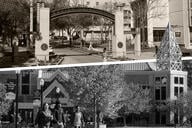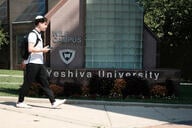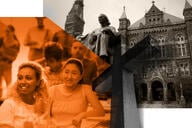You have /5 articles left.
Sign up for a free account or log in.
A rise in consumerist attitudes, the rapid advance of information technology capabilities, and globalization are buffeting American colleges of all sorts, compelling them to confront challenges abroad while competitive, consumerist pressures mount all the more at home, a senior Vatican official said in a speech Sunday at the Association of Catholic Colleges and Universities' annual meeting. Archbishop J. Michael Miller challenged Roman Catholic college leaders to adopt an "authentic, humanistic" response to those market-driven pressures in which their institutions look beyond borders to work with Catholic colleges worldwide -- in an attempt to narrow, rather than widen, the growing disparities in riches and resources that are creating a world of "haves and have-nots."
"Our colleges and universities can either turn in on themselves in nationalistic races for prestige, or they can forge bonds of solidarity,” Archbishop Miller said at the meeting, held in Washington. Archbishop Miller described a need for Catholic colleges in the United States to address the inequities reinforced by globalization, thus modernizing their answer to a Good Samaritan-inspired prompt, “Who and where is my neighbor university?”
With growing disparities in technological resources, universities in developing countries are at risk of becoming locked out of research opportunities, the Archbishop said. He told his audience, consisting mainly of leaders in American Catholic higher education, that the wealthy institutions -- “those are yours; you might not think so, but they are" -- have a responsibility to bridge the widening digital divide by forging mutually enriching research partnerships with institutions in developing countries with fewer resources. As centers for research and critical assessment, it is also the Catholic university's role, Archbishop Miller said, to thoroughly evaluate the positive and negative effects that globalization is having on “the human person.”
Meanwhile, Archbishop Miller described a need to respond to the commodification of education by stressing the love for wisdom and search for truth, renewing emphases on the humanities, and creating a “new, authentic” humanism privileging the whole student. Students, or people, should not be viewed as human capital, he said -- nor should they be encouraged to view themselves in such narrow and "degrading" terms.
Only once in his speech did the Archbishop allude to the challenge facing Catholic universities to stay, well, Catholic, a subject that grabbed attention after a 2005 speech at the University of Notre Dame in which Archbishop Miller told the audience that Pope Benedict XVI might favor “evangelical pruning,” as opposed to maintaining ties to more secular institutions. “May I suggest that it is by faithfulness to their ecclesiastical identity" that Catholic institutions can rise to meet the challenges presented by the three mega-trends, he posed at the end of his speech.
In a complementary keynote panel discussion on Catholic higher education in an American context, Cathleen Kaveny, a professor of law and theology at Notre Dame, also tackled the challenge of consumerist attitudes toward education. Too often, she said, Catholic institutions use the word “Catholic” for branding purposes. Administrators, she said, point to specific disciplines where they can easily emphasize Catholic identity -- counter-reformation studies in history, for example -- while neglecting to identify the way their faith informs a commitment to other disciplines, such as the hard sciences, where it’s more difficult to locate a Catholic logo, so to speak.
“We need to cultivate a notion of God as logos, God as both logos and love, reason and love,” Kaveny said, stressing that Catholic higher education should help foster a humble spirituality based on both a thirst for learning and a “radical unknowing” -- a notion, she said, “that we see God not just in the presences but in the absences.”
Other contributors to the panel discussion on Catholic higher education in an American context focused explicitly on issues of maintaining Catholic identity in a diverse country. William L. Portier, chair of Catholic theology at the University of Dayton, proposed an embrace of the term “evangelical Catholics,” to describe the “few but ubiquitous” overtly religious youths who bring new fervor to the religion and its institutions of higher education as they struggle to redefine themselves, increasingly under lay leadership, in a world without an economically distinct Catholic subculture. Portier described the tension between teaching Catholic formation and mainstreaming students into society -- a tension that Amelia Uelman, director of Fordham University School of Law’s Institute on Religion, Law and Lawyer’s Work, and the final speaker on Sunday’s panel, said should be confronted in the faculty hiring process.
Each department, Uelman said, should consist of faculty who serve as “sparks” -- those who can draw connections between faith and profession -- and “bridges,” those who can intuit how non-Catholics in a diverse society will interpret the Catholic message and who can help prepare students to participate in a pluralistic dialogue in their future careers.
“There is a lack of personal integration combined with a tremendous fear and insecurity that a religious message will be divisive,” Uelman said, emphasizing that many students see themselves as unable to apply their religious and moral identities to their professional lives. Each department, Uelman said, needs to emphasize to its students both the importance of preserving Catholic tradition and of sharing it with others.
The gathering of Catholic college leaders and educators in Washington continues through today, with sessions scheduled on promising directions in Catholic higher education, developing capacity to study the sector, congregational sponsorship, and student affairs at Catholic colleges.




